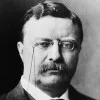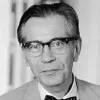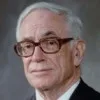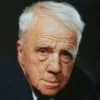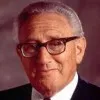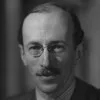So we started in to pay some attention to our neighbors to the south. Up to now our calling card to Mexico or Central America had been a gunboat or a bunch of Violets shaped like Marines. We could never understand why Mexico wasent just crazy about us; for we always had their good-will, and Oil and coffee and minerals, at heart.
Will Rogers (1879-1935) American humorist
Essay (1928-05-12), “More Letters from a Self-Made Diplomat to His President,” Saturday Evening Post, Vol. 200, No. 46
(Source)
Excerpted in Donald Day (ed.), The Autobiography of Will Rogers, ch. 14 (1949), which indicates Rogers' trip to Mexico was in December 1927. The text there is the same except at the very beginning, where it reads "We've started in to pay ..."
Shortened variant:I see where we are starting to pay some attention to our neighbors to the south. We could never understand why Mexico wasn't just crazy about us, for we have always had their good will, and oil and minerals, at heart.
Quotations about:
diplomacy
Note not all quotations have been tagged, so Search may find additional quotes on this topic.
Nations, like individuals, do not always see alike or think alike, and international cooperation and progress are not helped by any Nation assuming that it has a monopoly of wisdom or of virtue.
Franklin Delano Roosevelt (1882-1945) American lawyer, politician, statesman, US President (1933-1945)
Message (1945-01-06) to Congress, Annual Message (State of the Union)
(Source)
In 1945, Roosevelt delivered the SOTU as a written message to Congress, not as a speech.
Every honorable effort should always be made to avoid war, just as every honorable effort should always be made by the individual in private life to keep out of a brawl, to keep out of trouble; but no self-respecting individual, no self-respecting nation, can or ought to submit to wrong.
Theodore Roosevelt (1858-1919) American politician, statesman, conservationist, writer, US President (1901-1909)
Speech (1910-04-23), “Citizenship in a Republic [The Man in the Arena],” Sorbonne, Paris
(Source)
Principles of morality and considerations for our own security will never permit us to acquiesce in a peace dictated by aggressors and sponsored by appeasers. We know that enduring peace cannot be bought at the cost of other people’s freedom.
Franklin Delano Roosevelt (1882-1945) American lawyer, politician, statesman, US President (1933-1945)
Speech (1941-01-06) to Congress, Annual Message (State of the Union), “Four Freedoms,” Washington, D. C.
(Source)
In the battle of existence, Talent is the punch; Tact is the clever footwork.
Wilson Mizner (1876-1933) American screenwriter and wit
In Edward Dean Sullivan, The Fabulous Wilson Mizner (1935)
(Source)
They had all been brought up, as we still are, to believe in “the deterrent.” Firm resolve, a readiness to threaten war, would avert war itself. Some Power would always give way. This usually happened, indeed happened so often that the wisdom of the method seemed sure. In 1914 all the Powers, for different reasons, expected the yielding to come from the other side.
A. J. P. Taylor (1906-1990) British historian, journalist, broadcaster [Alan John Percivale Taylor]
“What Else Indeed?” New York Review of Books (5 Aug 1965)
(Source)
Diplomacy mostly consists of managing crazies who are making unreasonable demands in impossible situations with no solutions. And those are just our allies.
Nicholas Kristof (b. 1959) American journalist and political commentator
“The Foreign Relations Fumbler,” New York Times (16 Sep 2012)
(Source)
They know of no solutions to the paradoxes of the Middle East and Europe, the Far East and Africa except the landing of Marines. Being baffled, and also being very tired of being baffled, they have come to believe that there is no way out — except war — which would remove all the bewildering paradoxes of their tedious and now misguided attempts to construct peace. In place of these paradoxes they prefer the bright, clear problems of war — as they used to be. For they still believe that “winning” means something, although they never tell us what.
C. Wright Mills (1916-1962) American sociologist, academic, author [Charles Wright Mills]
The Causes of World War Three (1958)
(Source)
The dread of being duped by other nations — the notion that foreign heads are more able, though at the same time foreign hearts are less honest than our own, has always been one of our prevailing weaknesses.
Jeremy Bentham (1748-1832) English jurist and philosopher
Principles of International Law, Essay 4 “A Plan for Universal and Perpetual Peace” (1796-89)
(Source)
The hard line, which has always been arguable in theory and which has had some success in practice, views the imperatives of the cold war as an ineluctable challenge, has encouraged a skeptical view of the limits of negotiation, and has placed its primary trust in ample reserves of strength.
The pseudo-conservative line is distinguishable from this not alone in being more crusade-minded and more risk-oriented in its proposed policies but also in its conviction that those who place greater stress on negotiation and accommodation are either engaged in treasonable conspiracy (the Birch Society’s view) or are guilty of well-nigh criminal failings in moral and intellectual fiber (Goldwater’s).Richard Hofstadter (1916-1970) American historian and intellectual
“Goldwater and Pseudo-Conservative Politics,” sec. 4 (1965)
(Source)
One odd thing about foreign-policy professionals is that for all their sophistication, they tend to think the way to communicate with allies and potential allies is to compliment and sooth, compliment and soothe. But that isn’t polite, it’s patronizing, and to patronize is to insult. Candor is a compliment; it implies equality. It’s how true friends talk.
There are answers which, in turning away wrath, only send it to the other end of the room.
George Eliot (1819-1880) English novelist [pseud. of Mary Ann Evans]
Middlemarch, Book 3, ch. 24 (1871)
(Source)
An allusion to Proverbs 15:1 "A soft answer turneth away wrath."
But remember that talking is one of the fine arts — the noblest, the most important, the most difficult — and its fluent harmonies may be spoiled by the intrusion of a single harsh note. Therefore conversation which is suggestive rather than argumentative, which lets out the most of each talker’s results of thought, is commonly the pleasantest and the most profitable.
Tact is the ability to describe others as they see themselves.
Mary Pettibone Poole (fl. 1930s) American aphorist
A Glass Eye at a Keyhole, “Made in Manhattan” (1938)
(Source)
If we use no ceremony towards others, we shall be treated without any. People are soon tired of paying trifling attentions to those who receive them with coldness, and return them with neglect.
Tact is the art of putting your foot down without stepping on anyone’s toes.
Lawrence J. Peter (1919-1990) American educator, management theorist
Peter’s Almanac, “July 26” (1982)
(Source)
Base and absurd requests he should reject, not harshly but gently, informing the askers by way of consolation that the requests are not in accord with their own excellence and reputation.
It is no longer a choice, my friends, between violence and nonviolence. It is either nonviolence or nonexistence. And the alternative to disarmament, the alternative to a greater suspension of nuclear tests, the alternative to strengthening the United Nations and thereby disarming the whole world, may well be a civilization plunged into the abyss of annihilation, and our earthly habitat would be transformed into an inferno that even the mind of Dante could not imagine.
Martin Luther King, Jr. (1929-1968) American clergyman, civil rights leader, social activist, preacher
“Remaining Awake Through a Great Revolution,” National Cathedral, Washington, DC (31 Mar 1968)
(Source)
“Okay,” I said to Teldra. “Look. I’ll concede that, over the years, I’ve learned that there’s no point in making a bad situation worse, and that it’s less work to talk yourself out of a tough spot than to slice your way out, and that words, while potentially deadly, are less deadly than Morganti daggers. But I don’t think that is quite the same thing as being courteous.”
“I believe, Lord Taltos, that it is very much the same thing.”
See, free nations are peaceful nations. Free nations don’t attack each other. Free nations don’t develop weapons of mass destruction.
George W. Bush (b. 1946) US President (2001-2009)
Speech, Milwaukee (3 Oct 2003)
(Source)
Referring to insurgencies in Iraq.
When I think about all the money we spent on bombs and munitions, and our failures in Viet Nam, Iraq, Afghanistan and other places around the world … Instead of advancing our agenda using force, we should have instead built schools and hospitals in these countries, improving the lives of their children. By now, those children would have grown into positions of influence, and they would be grateful to us instead of hating us.
George Shultz (b. 1920) American economist, statesman, and businessman
(Attributed)
(Source)
Quoted in In Daniel Levitin, The Organized Mind (2014).
Physicists and astronomers see their own implications in the world being round, but to me it means that only one-third of the world is asleep at any given time and the other two-thirds is up to something.
We have no eternal allies, and we have no perpetual enemies. Our interests are eternal and perpetual, and these interests it is our duty to follow.
There can be no greater error than to expect or calculate upon real favors from nation to nation. It is an illusion which experience must cure, which a just pride ought to discard.
If crisis management requires cold and even brutal measures to show determination, it also imposes the need to show the opponent a way out. Grandstanding is good for the ego but bad for foreign policy. […] Many wars have started because no line of retreat was left open.
We cannot safely confine government programs to our own domestic progress and our own military power. We could be the wealthiest and the most mighty nation and still lose the battle of the world if we do not help our world neighbors protect their freedom and advance their social and economic progress. It is not the goal of the American people that the United States should be the richest nation in the graveyard of history.
We will have to want peace, want it enough to pay for it, pay for it in our own behavior and in material ways. We will have to want it enough to overcome our lethargy and go out and find all those in other countries who want it as much as we do.
We have borne patiently a great deal of wrong, on the consideration that if nations go to war for every degree of injury, there would never be peace on earth. But when patience has begotten false estimates of it’s motives, when wrongs are pressed because it is believed they will be borne, resistance becomes morality.
Thomas Jefferson (1743-1826) American political philosopher, polymath, statesman, US President (1801-09)
Letter (1807-07-16) to Anne-Louise-Germaine Necker, Baronne de Staël-Holstein
(Source)
We must show by our behavior that we believe in equality and justice and that our religion teaches faith and love and charity to our fellow men. Here is where each of us has a job to do that must be done at home, because we can lose the battle on the soil of the United States just as surely as we can lose it in any one of the countries of the world.
It would be some time before I fully realized that the United States sees little need for diplomacy; power is enough. Only the weak rely on diplomacy. This is why the weak are so deeply concerned with the democratic principle of the sovereign equality of states, as a means of providing some small measure of equality for that which is not equal in fact. Coming from a developing country, I was trained extensively in international law and diplomacy and mistakenly assumed that the great powers, especially the United States, also trained their representatives in diplomacy and accepted the value of it. But the Roman Empire had no need for diplomacy. Nor does the United States. Diplomacy is perceived by an imperial power as a waste of time and prestige and a sign of weakness.
But to those who expect us to calculate whether a compliance with unjust demands will not cost us less than a war we must leave as a question of calculation for them also whether to retire from unjust demands will not cost them less than a war. We can do to each other very sensible injuries by war, but mutual advantages of peace make that the best interest of both.
Thomas Jefferson (1743-1826) American political philosopher, polymath, statesman, US President (1801-09)
Message (1804-11-08) to Congress, Annual Message (State of the Union)
(Source)
My hope of preserving peace for our country is not founded in the quaker principle of non resistance under every wrong, but in the belief that a just and friendly conduct on our part will procure justice and friendship from others, and that, in the existing contest, each of the combatants will find an interest in our friendship.
Thomas Jefferson (1743-1826) American political philosopher, polymath, statesman, US President (1801-09)
Letter (1803-07-10) to the Earl of Buchan
(Source)
The way chosen by the United States was plainly marked by a few clear precepts, which govern its conduct in world affairs.
First: No people on earth can be held, as a people, to be enemy, for all humanity shares the common hunger for peace and fellowship and justice.
Second: No nation’s security and well-being can be lastingly achieved in isolation but only in effective cooperation with fellow-nations.
Third: Any nation’s right to form of government and an economic system of its own choosing is inalienable.
Fourth: Any nation’s attempt to dictate to other nations their form of government is indefensible.
And fifth: A nation’s hope of lasting peace cannot be firmly based upon any race in armaments but rather upon just relations and honest understanding with all other nations.
Peace and friendship with all mankind is our wisest policy, and I wish we may be permitted to pursue it. But the temper and folly of our enemies may not leave this in our choice.
Thomas Jefferson (1743-1826) American political philosopher, polymath, statesman, US President (1801-09)
Letter (1786-05-06) to C. W. F. Dumas
(Source)
Honest statesmanship is the wise employment of individual meannesses for the public good.
Abraham Lincoln (1809-1865) American lawyer, politician, US President (1861-65)
(Attributed)
(Source)
Attributed in John G. Nicolay and John Hay, Abraham Lincoln: A History, vol. 10, ch. 18 "Lincoln's Fame" (1886).
Always a friend to peace, & believing it to promote eminently the happiness & prosperity of mankind, I am ever unwilling that it should be disturbed, as long as the rights & interests of the nation can be preserved. but whensoever hostile aggressions on these require a resort to war, we must meet our duty, & convince the world that we are just friends & brave enemies.
Thomas Jefferson (1743-1826) American political philosopher, polymath, statesman, US President (1801-09)
Letter (1806-12-03) to Andrew Jackson
(Source)
I have ever deemed it fundamental for the United States never to take an active part in the quarrels of Europe. Their political interests are entirely distinct from ours. Their mutual jealousies, their balance of power, their complicated alliances, their forms and principles of government, are all foreign to us. They are nations of eternal war.
Thomas Jefferson (1743-1826) American political philosopher, polymath, statesman, US President (1801-09)
Letter (1823-06-11) to James Monroe
(Source)
One lesson you better learn if you want to be in politics is that you never go out on a golf course and beat the President.
Lyndon B. Johnson (1908-1973) American politician, educator, US President (1963-69)
Comment (1964) to Larry O’Brien III
(Source)
On the occasion of O'Brien beating Johnson by one stroke on a nine-hole golf outing. Noted by his father in his book, No Final Victories: A Life in Politics, ch. 8 "LBJ" (1974).
See Gracian.
And we must face the fact that the United States is neither omnipotent or omniscient — that we are only six percent of the world’s population — that we cannot impose our will upon the other ninety-four percent of mankind — that we cannot right every wrong or reverse each adversity — and that therefore there cannot be an American solution to every world problem.
The greatest favors may be done so awkwardly and so bunglingly as to offend; and disagreeable things may be done so agreeably as almost to oblige.
Lord Chesterfield (1694-1773) English statesman, wit [Philip Dormer Stanhope]
Letter to his son, #249 (7 Apr 1751)
(Source)
Just as our national policy in internal affairs has been based upon a decent respect for the rights and the dignity of all our fellow men within our gates, so our national policy in foreign affairs has been based on a decent respect for the rights and dignity of all nations, large and small. And the justice of morality must and will win in the end.
Franklin Delano Roosevelt (1882-1945) American lawyer, politician, statesman, US President (1933-1945)
Speech (1941-01-06), “State of the Union [Four Freedoms],” Washington, D. C.
(Source)
So let us begin anew — remembering on both sides that civility is not a sign of weakness, and sincerity is always subject to proof. Let us never negotiate out of fear. But let us never fear to negotiate.
My friend Sir Roger heard them both upon a round trot; and after having paused some time, told them with an air of a man who would not give his judgment rashly, that “much might be said on both sides.”
Joseph Addison (1672-1719) English essayist, poet, statesman
Essay (1711-07-20), The Spectator, No. 122
(Source)
DIPLOMACY, n. The patriotic art of lying for one’s country.
Ambrose Bierce (1842-1914?) American writer and journalist
“Diplomacy,” The Cynic’s Word Book (1906)
(Source)
Included in The Devil's Dictionary (1911). Originally published in the "Devil's Dictionary" column in the San Francisco Wasp (1882-03-24).



